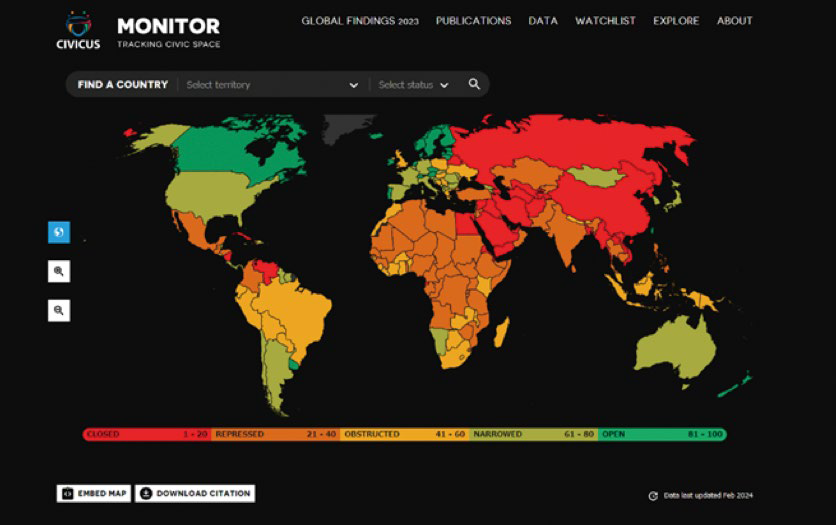Inochi Declaration
Protect civic space that forms the foundation of open and democratic societies, enabling citizens to freely speak, act, and participate.
“Civic space” refers to the social environment and opportunities where citizens can engage in free dialogue and actions. Globally, this space is shrinking, raising serious concerns. The concept of civic space is closely linked to the Sustainable Development Goals (SDGs), particularly Goal 16 (Peace, Justice and Strong Institutions). Among the 12 targets under Goal 16, the protection of civic space is explicitly recognized as essential to ensuring freedom of association and expression.
In Japan, various efforts are being made to prevent the erosion of civic space both domestically and abroad. Organizations such as THINK Lobby (a division of the Japan NGO Center for International Cooperation – JANIC), the NGO Action Network on Civic Space (NANCiS), and C&C Link (Citizen and Corporations Link) collaborate with Asian partner organizations to safeguard and expand civic space across the region. Their activities include research on the state of civic space, workshops and training programs, social media campaigns, policy recommendations to governments, and the development of a “Civic Charter on Civic Space.” The outcomes of these initiatives are also shared through forums such as the Tokyo Democracy Forum.
CIVICUS, an international NGO that monitors civic space trends globally, publishes the CIVICUS Monitor annually to report on the state of civic freedoms. According to the 2024 report, civic space continues to shrink globally. Around one-third of the world’s population now lives in countries classified as “closed.” This figure is the highest recorded since monitoring began in 2018*1. In contrast, only about 2% of the world’s population lives in “open” countries where civic space is fully guaranteed, and even that percentage is declining. In Asia, Taiwan is the only country categorized as “open.” Japan, along with South Korea, Timor-Leste, and Mongolia, is rated as “narrowed.”
Factors contributing to Japan’s classification include its Act on the Protection of Specially Designated Secrets, which has been criticized for its vague criteria and broad scope, allowing authorities significant discretion to classify information. There have also been reports of political figures exerting pressure on media outlets, raising concerns over press freedom. In Bangladesh, for example, violent clashes occurred in July 2024 between students and security forces during protests demanding the abolition of civil service quotas favoring veterans’ families. These clashes resulted in numerous arrests and casualties. According to CIVICUS, Bangladesh is classified as a “closed” state where the government routinely suppresses civil liberties through arbitrary detention, torture, and silencing of dissenting voices. Critical journalists face intimidation, and some media outlets have been forced to shut down.

CIVICUS Monitor 2024
The rise of the internet and social media has enabled citizens to collect information, express opinions, and organize online campaigns and petitions. Civil society organizations and nonprofits addressing issues such as human rights, environmental protection, poverty, and arbitrary detention are now able to disseminate information more widely. However, this expanded reach has also led to increased government censorship and tighter control of online expression, making it increasingly difficult for citizens to speak freely.
To maintain and develop a healthy civic space, we must address these challenges and create an environment where all individuals can express their opinions and take action safely and freely. The Inochi Forum will participate in global civic networks such as Forus*2 and the Asia Development Alliance (ADA)*3 to advance collaborative efforts to ensure civic space remains open and inclusive.
[Notes]
*1 CIVICUS Monitor rating methodology
https://monitor.civicus.org/about/how-it-works/ratings/
*2 Forus
https://www.forus-international.org/en
*3 Asia Development Alliance (ADA)
https://ada2030.org/index.php
[References]
・UN 2030 Agenda for Sustainable Development (Japanese): https://www.mofa.go.jp/mofaj/gaiko/oda/sdgs/pdf/000101402_2.pdf
・CIVICUS Monitor 2023:
https://monitor.civicus.org/
[Action Platform]
Peace and Human Rights
[SDGs]


